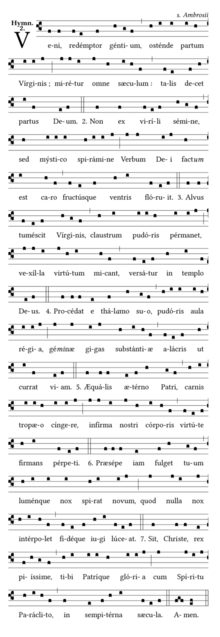Veni redemptor gentium
Veni redemptor gentium, Kom världens frälsare, är en latinsk adventspsalm av Ambrosius av Milano.[1] [2]
Historia
Den senare hymnen Veni Creator Spiritus lånar två rader från hymnen Infirma nostri corporis — Virtute firmans perpeti. "Veni redemptor gentium" var särskilt populär i Tyskland och Martin Luther överstte den till tyska som Nun komm, der Heiden Heiland, som han senare satte som korla, eller möjligen Johann Walter. [3] Luther använde origalhymnen till tre andra psalmer: "Verleih uns Frieden gnädiglich", "Erhalt uns, Herr, bei deinem Wort" och "Gib unserm Fürsten und aller Obrigkeit".
I mitten av 1800-talet översatte John Mason Neale hymnen till Engelska som "Come, thou Redeemer of the earth". Den sjungs ofta till melodin "Puer nobis nascitur" av Michael Praetorius.
Text
| Latin | English |
|---|---|
| 1. Veni, redemptor gentium;
ostende partum Virginis; miretur omne saeculum: talis decet partus Deum. |
Come, thou Redeemer of the earth,
and manifest thy virgin-birth: let every age adoring fall; such birth befits the God of all. |
| 2. Non ex virili semine,
Sed mystico spiramine Verbum Dei factum caro Fructusque ventris floruit. |
Begotten of no human will,
But of the Spirit, Thou art still The Word of God in flesh arrayed, The promised fruit to men displayed. |
| 3. Alvus tumescit Virginis,
Claustra pudoris permanent, Vexilla virtutum micant, Versatur in templo Deus. |
The virgin womb that burden gained
With virgin honor all unstained; The banners there of virtue glow; God in His temple dwells below. |
| 4. Procedens de thalamo suo,
Pudoris aula regia, Gemine gigas substantiae, Alacris ut currat viam. |
Forth from His chamber goeth He,
That royal home of purity, A giant in two-fold substance one, Rejoicing now His course to run. |
| 5. Egressus ejus a Patre,
Regressus ejus ad Patrem: Excursus usque ad inferos Recursus ad sedem Dei. |
From God the Father He proceeds,
To God the Father back He speeds; His course He runs to death and hell, Returning on God's throne to dwell. |
| 6. Aequalis eterno Patri,
Carnis trophato accingere: Infirma nostri corporis Virtute firmans perpeti. |
O equal to the Father, Thou!
Gird on Thy fleshly mantle now; The weakness of our mortal state With deathless might invigorate. |
| 7. Presepe jam fulget tuum,
Lumenque nox spirat novum, Quod nulla nox interpolet, Fideque jugi luceat. |
Thy cradle here shall glitter bright
And darkness breathe a newer light, Where endless faith shall shine serene, And twilight never intervene. |
The metrical English translation was made by J. M. Neale.
Källor
</references>
- ↑ Christine Mohrmann Études sur le latin des chrétiens, vol. I, Le latin des chrétiens - Page 167 "Pour illustrer ce que j'ai dit, je citerai deux strophes de l'hymne de Noël de saint Ambroise, intitulé: Veni redemptor gentium: Veni redemptor gentium Ostende partum virginis Miretur omne saeculum Talis decet partus Deum. J'ai fait observer ...
- ↑ Hymnal Noted, Pt. I (John Mason Neale and Rev. Thomas Helmore, eds.), London: Novello & Co., 1856, #12, pp. 35-36
- ↑ Paul Westermeyer Let the People Sing: Hymn Tunes in Perspective 2005 Page 61 "Advent Ambrose's Advent hymn "Veni redemptor gentium," discussed in Chapter II, was well known in Germany. Luther translated it into German. Then he, or possibly Walter, simplified its chant tune, VENI REDEMPTOR GENTIUM, into the chorale tune that takes its German name from Luther's translation, NUN KOMM, DER HEIDEN HEILAND." For a comparison of the chorale tune to the original chant melody, see "Chorale Melodies used in Bach's Vocal Works: Nun komm, der Heiden Heiland," Bach Cantatas Website, accessed 2014-08-27.
